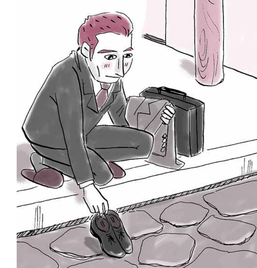Manners You Should Know - Summarized
マナーとして覚えておきたいこと―まとめ―
マナーとして覚えておきたいこと―まとめ―
When you address someone (1 in ) business, you should add “sama” or “san” after their surname.
ビジネスにおいて誰かの名前を言うときは、名字の後に「様」「さん」を付けます。
(2 During ) work, generally keigo (honorific expressions) is used.
仕事中は基本的に敬語を使います。
When you meet a client, don’t come later (3 than ) the appointed time.
取引先と会うときは、約束の時間に遅れないよう行きます。
It is advisable to arrive five to ten minutes earlier (4 than ) promised. If you are going to be late be sure to inform them (5 over ) the phone beforehand.
約束の5分から10分前には到着しましょう。遅れるときは必ず事前に電話で連絡します。
You should remove your coat or scarf (6 before ) entering an office.
コートやマフラーは、建物に入る前に脱ぎます。
When discussing business (7 in ) a Japanese room, you may be required to remove your shoes. In this situation, you should place them with the toes facing (8 towards ) the exit.
和室で商談するときには靴を脱ぐことがあります。その場合には靴の先を出口方向に向けておきます。
When you meet a person (9 for ) the first time, you should hand over your business card (10 to ) that person.
初対面のときは名刺を渡しましょう。
It is not customary to hug (11 in ) Japan.
日本ではハグをする習慣はありません。
The phrase “Osewani natte orimasu” is often used (12 as ) a greeting.
あいさつ言葉として、「お世話になっております」がよく使われます。
Sometimes, you may bring a gift (13 as ) a token of gratitude.
お世話になっているお礼の気持ちとして手みやげを持っていくこともあります。
(14 In ) conversation you should sit straight. Conduct such as crossing your legs, putting your elbow (15 on ) the table, or turning to one side, creates a bad impression.
会話中は、姿勢をまっすぐにして座りましょう。足を組む、テーブルに肘をつく、体を斜めに向けるなどの行為は、失礼な印象を与えます。
To introduce awkward topics, you should use “cushion words.” (16 For ) example: “Osore irimasu ga,” and “Shitsurei desu ga.”
気まずいことを話題にするときは、クッション言葉を取り入れましょう。「恐れ入りますが」「失礼ですが」などです。
(17 Whatever ) the country, a smile and an easy to understand style of speech creates a good impression.
どの国でも、笑顔と優しい話し方は良い印象につながります。
ビジネスにおいて誰かの名前を言うときは、名字の後に「様」「さん」を付けます。
(2 During ) work, generally keigo (honorific expressions) is used.
仕事中は基本的に敬語を使います。
When you meet a client, don’t come later (3 than ) the appointed time.
取引先と会うときは、約束の時間に遅れないよう行きます。
It is advisable to arrive five to ten minutes earlier (4 than ) promised. If you are going to be late be sure to inform them (5 over ) the phone beforehand.
約束の5分から10分前には到着しましょう。遅れるときは必ず事前に電話で連絡します。
You should remove your coat or scarf (6 before ) entering an office.
コートやマフラーは、建物に入る前に脱ぎます。
When discussing business (7 in ) a Japanese room, you may be required to remove your shoes. In this situation, you should place them with the toes facing (8 towards ) the exit.
和室で商談するときには靴を脱ぐことがあります。その場合には靴の先を出口方向に向けておきます。
When you meet a person (9 for ) the first time, you should hand over your business card (10 to ) that person.
初対面のときは名刺を渡しましょう。
It is not customary to hug (11 in ) Japan.
日本ではハグをする習慣はありません。
The phrase “Osewani natte orimasu” is often used (12 as ) a greeting.
あいさつ言葉として、「お世話になっております」がよく使われます。
Sometimes, you may bring a gift (13 as ) a token of gratitude.
お世話になっているお礼の気持ちとして手みやげを持っていくこともあります。
(14 In ) conversation you should sit straight. Conduct such as crossing your legs, putting your elbow (15 on ) the table, or turning to one side, creates a bad impression.
会話中は、姿勢をまっすぐにして座りましょう。足を組む、テーブルに肘をつく、体を斜めに向けるなどの行為は、失礼な印象を与えます。
To introduce awkward topics, you should use “cushion words.” (16 For ) example: “Osore irimasu ga,” and “Shitsurei desu ga.”
気まずいことを話題にするときは、クッション言葉を取り入れましょう。「恐れ入りますが」「失礼ですが」などです。
(17 Whatever ) the country, a smile and an easy to understand style of speech creates a good impression.
どの国でも、笑顔と優しい話し方は良い印象につながります。


 RSS Feed
RSS Feed